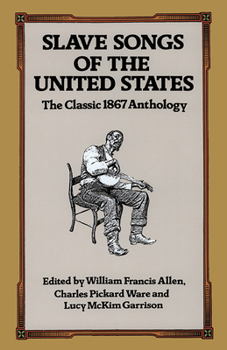Slave Songs of the United States
Select Format
Select Condition 
Book Overview
First published in 1867, this landmark book represented the first systematic effort to collect and preserve the songs sung by the plantation slaves of the Old South. To ensure authenticity, the editors notated most of the melodies and words directly from the singers themselves. The result was a rare musical treasury containing complete music and lyrics for over 130 songs, arranged by geographical region. Among them are: Roll, Jordan, Roll; Jehovah, Hallelujah; I hear from Heaven to-day; Michael, row the boat ashore; Turn sinner, turn O; Nobody knows the trouble I've had; No Man can hinder me; Heave away; Charleston Gals; I'm gwine to Alabamy; I want to die like-a Lazarus die; Belle Layotte; On to Glory Jacob's Ladder; My Father, how long?; Musieu Bainjo; Lean on the Lord's side; God got plenty o' room. The book presents the melody lone and all the known verses to each song. The editors also include directions for singing, along with a commentary on each song's history, its possible variations, what some of its key references mean and other pertinent details. A new preface to the Dover edition by Harold Courlander appraises the book's importance in American musical and cultural history.
Format:Paperback
Language:English
ISBN:0486285731
ISBN13:9780486285733
Release Date:July 1995
Publisher:Dover Publications
Length:192 Pages
Weight:2.15 lbs.
Dimensions:0.4" x 5.4" x 8.5"
Customer Reviews
4 ratings
Historically signficant with many unknown gems
Published by Thriftbooks.com User , 15 years ago
Originally published in 1867 and reprinted in a more modern edition, this book of Slave Songs provides insights into performance practice and African-American cultural of the middle of the 19th century. Following the dialect and the purpose of each song as presented in the introductory material is a bit challenging but also rewarding. Especially fascinating was the explanation on the "shout" and the use of the music in religious settings. Meaningful as a primary source and a direct understanding of the use of the language in music, this book of songs is an important and necessary resource for historians of African-American music. Aside from some of the musical flaws in the notation, the music is generally clear with a nice balance of text and actual music. Thankfully this book exists, for without it, much of this music would be lost due to its lack of usage in modern culture. A careful study reveals many great and meaningful songs virtually unknown in today's world. Perhaps some of the songs could and should be included in the canon of fine American folk music.
A trove
Published by Thriftbooks.com User , 17 years ago
There are 136 songs in this book, most of which are no longer sung. They are simply amazing, musically and theologically. An example: "Come and Go With Me", collected in Augusta, GA, presents a major scale with a flat 6th and 7th, and the tune ends on the 4th. Unfortunately, the collectors, as went on for generations as standard procedure, did not acknowledge the names of any of their sources. The original "Michael Row the Boat Ashore" is in here; it is a rowing song from the sea islands, addressed to the archangel Michael as a prayer for safe passage; these lyrics are more striking than the familiar ones. Here are the complete lyrics to "Come and Go With Me", which is singular both in its scale and its notion that heaven is in the present, to be accepted rather than earned: Ole Satan is a busy ole man He roll stones in my way Master Jesus is my bosom friend He roll 'em out my way Oh, come and go with me Oh, come and go with me Oh, come and go with me A-walking in the heaven I roam I did not come here myself my Lord It was my Lord who brought me here And I really do believe I'm a child of God A-walking in the heaven I roam Oh, come and go with me Oh, come and go with me Oh, come and go with me A-walking in the heaven I roam It was reported that the freed slaves did not want to remember their old songs. And we all have reasons for forgetting a painful past. But look at these songs; they are the heart and soul's truth of life. It is not too late to learn from these people. Put this music in your heart. Water spring that never dry, Hallelu, Hallelu The more we dig, the more it spring, Hallelujah!
An Exceptional Tool
Published by Thriftbooks.com User , 19 years ago
Those who love spirituals often find the origins of spirituals in general to be elusive, if not impossible to track with any degree of reliability. Though this collection of spirituals is quite limited in terms of being highly localized (versus attempting to comprehend all of the spirituals of all of the South), it covers many of the best-loved Negro spirituals. Published first in 1867, it provides perhaps the strongest link for the largest grouping of spirituals, contemporaneous (or nearly so) with the music it attempts to capture. For those who love the Negro spiritual, this is a 'must have' for your collection.
A great historical account of forgotten American History
Published by Thriftbooks.com User , 25 years ago
This book gives great insight in to the true meaning of African American slaves songs. This book also discusses the origin and uses of the songs and provides footnotes for most of the colloquials and variations in dialect for each song.






